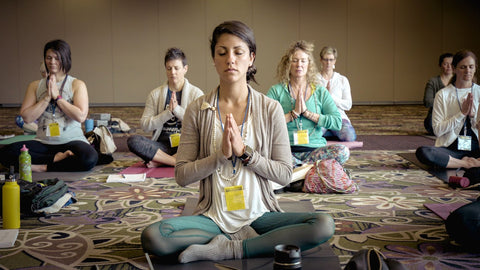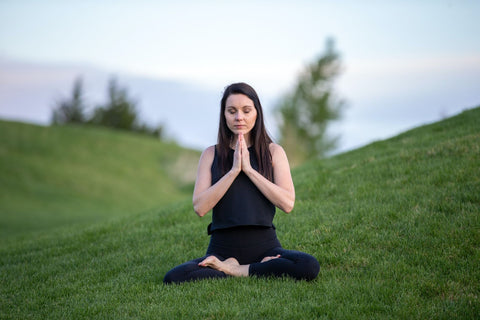
Is your new year’s resolution all about getting to a healthier and happier you? Start off the year right by focusing on MINDFULNESS.
A state of ‘mindfulness’ is created when the brain learns to detach itself from the worries of tomorrow and the stresses of yesterday to fully appreciate the moment of ‘the now.’
The personal path to mindfulness isn’t only reached through meditation, although this is the path that most devout yogis know best. For those who veer from meditative practices for personal or religious reasons, there are other conduits to achieve mindfulness.
Writer Jay Dixit, in Psychology Today, posited six ways for individuals to become more mindful:
- Stop thinking about performance. Most of us worry about ourselves and how we look, but, really as Dixit points out—and as most everyone eventually discovers in life—over-thinking makes performance worse. Instead, Dixit suggests thinking about something else…anything else to get the mind away from the actual task.
- Don’t worry about the future (just be in the now).Worrying about the future or the past is fruitless, as there is nothing that can be done to change the past and the future is a mystery. Think about the moment, and focus on the present versus worrying about tomorrow or yesterday.
- Breathe. The breath is a crucial focus in yoga for a reason. By paying attention to just the breath, the mind doesn’t have the ability to fixate on outside worries.
- Go with the flow and keep busy. This requires mental engagement…did you ever notice how fast the day flies when work is busy (this is an example of ‘flow’ per psychology). When we anticipate the next task, we don’t have time to brood.
- Face the hurt and the worries, and come to a place of psychological acceptance. Don’t avoid the fear, the sadness or the pain. Accept it. It happened, let yourself feel the emotion. Then, you can move on.
- Pay attention to the details. In everything. Assume the tiniest detail is important, because sometimes…it is.
And, of course, the truly best way to help increase a psychological state of mindfulness is to sit quietly. This doesn’t have to be a meditative session. Just a bit of personal, relaxing quiet time. When you find the perfect way to help achieve your mindful outlook, the body and the mind will reap the benefits.
A Mindful Brain
Mindfulness isn’t just a state of mind—mindfulness CHANGES the mind. By adopting a lifestyle focused on mindfulness, an individual may alter the brain’s physiological responses to emotions and stress.
A 2010 study revealed that an eight-week session on mindfulness positively impacted the way subjects handled stress and emotions (which was tested by having all participants watch a sad film). According to the study, the group who participated in the mindfulness training showed “less anxiety, depression and somatic distress compared with the control group.” Results were backed by MRI data. Individuals who participated in the mindfulness sessions “had less neural reactivity when they were exposed to the films than the control group, and they displayed distinctly different neural responses while watching the films than they did before their mindfulness training.”

Meditation also has been shown to reduce the impact of aging on the brain. As the body (and the brain) ages, physical and mental changes occur that affect daily activities. One of the most frustrating aspects of aging is changes in memory...or, rather, we become a bit more forgetful.
A study conducted in 2007 explored mindful meditation and its role in aging. In particular, the researchers looked at attention and the quantification of healthy gray matter within the brain. Gray matter helps process information in the brain, and often declines with age. The control group showed a decline in both attention and a decrease of gray matter. However, individuals that practiced meditation did not display the negative age correlation related to gray matter on the brain.
Mindfulness & Relationships
There is no perfect equation for relationship success. But finding balance, focusing on positivity and nurturing the love and romance is vital for any healthy relationship.
Training the mind to find a center and appreciate the moment positively affects romantic relationships. Ideally, the couple should enter into mindful meditation and training as a partnership…each practicing his or her own desired form of meditation.

At the University of North Carolina-Chapel Hill, researchers studied how mindfulness practices affect romantic relationships. The UNC team discovered that couples practicing mindfulness positively improved their “levels of relationship satisfaction, autonomy, relatedness, closeness, acceptance of one another, and relationship distress.”
In January, adopt mindfulness and explore the many ways that training the mind can enhance the body and everyday life. The art of mindfulness boosts the brain, enhances the joys of physical intimacy, improves relationships, and helps kids and teens cope with stress and learning. Namaste.






